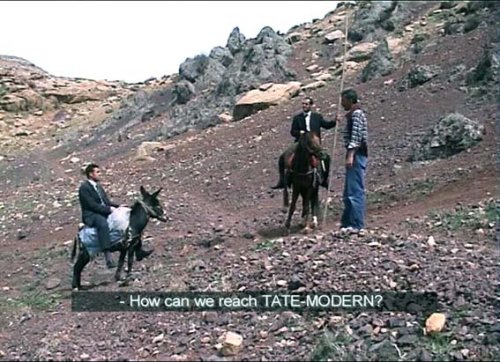Sener Ozmen
dal 9/5/2005 al 14/5/2005
Segnalato da
9/5/2005
Sener Ozmen
Galerie Schleicher+Lange, Paris
Video surveillance_002. Working in different medias such as photography and drawing, the artist is known mainly for his video work. Often commenting in his works on cultural differences and traditions by presenting them in a sometimes humorous, sometimes chilling way, he usually stages his settings in a documentary-style.

Video surveillance_002
For the first time in France, galerie schleicher+lange is proud to present a
mini-retrospective of Sener Özmen's works for the occasion of vidéo
surveillance_002.
Born 1971 in Idil, Sirnak / South East Turkey, Sener Özmen studied at the Department
of Painting in the University of Cukurova, Adana (TR) in 1998. He currently lives in
the Kurdish city of Diyarbakir (TR).
Working in different medias such as photography and drawing, Sener Özmen is known
mainly for his video work. In recent years, he has participated in numerous art
manifestations on an international level.
Among others, he took part in exhibitions like 'In the gorges of the Balkans' (2003)
at the Kunsthalle Fridericianum Kassel (D), a survey of contemporary art from the
Balkans curated by René Block and the 'U-Topos, Tirana Biennale 2' (2003) at the
National Museum of History, Tirana, (AL); in 2004, Özmen participated in
'Reappearance', at the Museum of Kosova, Prishtina, (Kosova), in 'Mediterraneans',
Museo D'Arte Contemporanea Roma (I), 'The Yugoslav Biennial of Young Artists 2004',
at the Cultural Center of Vrsac and Belgrade, (YU), the 'Sevilla Biennial I',
Sevilla, (E) curated by Harald Szeemann, 'Love It or Leave It / Cetinje Biennial V',
Diyarbakir Sanat Merkezi, Diyarbakir (TR) and in 'Art For', Garanti Platform Güncel
Sanat Merkezi, Istanbul, (TR), curated by Vasif Kortun (2004-2005).
Between December 2004 and March 2005, Özmen's work was presented as part of the
inaugural exhibition of the Istanbul Modern Museum, Istanbul (TR), 'The Making of
Istanbul Modern' curated by Fulya Erdemci.
Often commenting in his works on cultural differences and traditions by presenting
them in a sometimes humorous, sometimes chilling way, Özmen usually stages his
settings in a documentary-style. His latest video 'The work' (2005) portrays two
women sitting on the floor working in silence without even looking up; they seem to
be following their daily duties in perfect routine, giving the impression they were
knitting a carpet or blanket. But in fact, they are only simulating to knit; instead
of producing a blanket, they are destroying a large sheet of bubble-wrap with
careful precision.
His video 'Exit' (2004) gives a disturbing account of a young man who tries pulling
himself out of a ruin, only to find himself in there again. The piece can be seen on
the one hand as a reference to the fatal consequences of a country haunted by earth
quakes as well as to the often overlooked building regulations in the development of
Turkey's main cities in recent years; on the other hand, it functions on a more
symbolic level, pointing out the struggle of acceptance for people of certain ethnic
origins in Turkey, such as the Kurds.
The horrific feeling of being trapped in a vicious circle is further underlined by
the fact that the video is soundless, possibly symbolising that there is no
possibility for the young man to speak out for himself.
In a recent collaboration with Erkan Özgen (*1971) entitled 'Road to Tate Modern'
(2003), we see two men (the artists) on what seems to be a long and strenuous
travel, riding through the mountains in South East Anatolia, one on a horse and the
other following a donkey. The figures unmistakably refer to Don Quixote de la Mancha
and his servant Sancho Pansa, one of the most famous protagonist couple in the
history of literature.
Seemingly being lost, the travellers ask a passer-by for directions, stating their
wanted destination as the Tate Modern. In a humorous but nevertheless critical way,
Özmen points out the impossibilities of finding a way of being accepted in what
still is a very exclusive hierarchy of the Western contemporary art scene.
galerie schleicher+lange
12, rue de picardie
75003
paris



